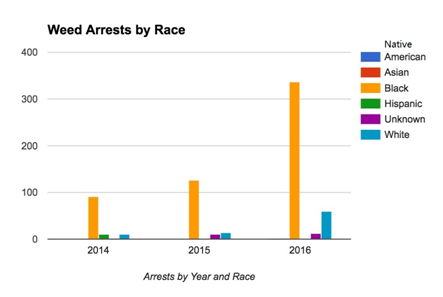By Guy Page
Since the Vermont Legislature voted to legalize marijuana last May, three major national news outlets — the Washington Post, National Public Radio (NPR) and U.S. World & News Report — have reported on the failure of a similar “personal use” city ordinance in Washington, D.C. to fix two significant problems it was supposed to solve: disproportionate arrests of African-Americans and illegal sale.
In Vermont, H.511, legalization of personal cultivation and possession of marijuana, will be debated by the full Vermont House beginning 9:30 a.m. Thursday. If approved, it will go to Gov. Phil Scott for his signature. A last-minute press-conference by Aubree Adams, a Colorado mom whose son was seriously injured by ingesting high potency THC, will be held 8:30 a.m. in the Cedar Creek Room.
Arrests for public consumption of marijuana have tripled in the District since pot was legalized in 2015, and the arrests have been disproportionate among African-Americans, according to a July 2017 Washington Post news report.

Marijuana-related arrests in Washington, D.C. (credit: Daniel Nguyen/Muckrock)
Also, National Public Radio reported July 30, 2017, that marijuana is being sold through a distribution scheme that flaunts the D.C. law’s prohibition of sales. U.S. World & News Report noted in June that arrests for marijuana distribution have returned to pre-legalization levels.
Arrests of African-Americans in Washington on pot-related charges went from about 90 in 2014 to about 120 in 2015 and jumped to about 330 in 2016, according to news reports based on D.C. Metro PD arrest data obtained via FOIA.
Arrests across all ethnic groups totaled about 400 in 2016. African-Americans comprise only about half of the total D.C. population. Clearly, despite legalization, arrests are dramatically increasing and are still ethnically disproportionate. 2017 data is unavailable.
Most of these arrests were made for smoking marijuana in public, which is still illegal in D.C. Vermont’s H.511 also prohibits smoking in public places (page 6, 2-A). It is unclear how Vermont will prevent a similar increase in public consumption arrests.
Supporters of H.511 say it forbids the sale of marijuana. Yet NPR on July 30 reported that young D.C. “entrepreneurs” (pot dealers) are getting around the the District’s banning of sales by selling clothing or food for exorbitant prices and including “free” marijuana as a bonus. Nothing in H.511 would expressly prohibit Vermont “entrepreneurs” from imitating the practice.
Vermont Yankee hearing postponed due to expected snowfall
The Vermont Public Utilities Commission hearing on the sale of Vermont Yankee to NorthStar scheduled for Thursday has been postponed due to the expected blizzard. A make-up date will be announced soon.
School, health, electricity cost hikes to take an extra $2,000 from average Vermont household in 2018
The Campaign for Vermont has identified an estimated $2000 per-household cost increase in 2018 — even before any new minimum wage, lake cleanup, paid family leave, etc. legislation is passed this year — in three major areas: Energy rates for Green Mountain Power (77 percent of all ratepayers) will rise by about 5 percent (Vermont Electric Coop customers, however, will not see a rate increase); Blue Cross Blue Shield premiums will rise 9.2 percent; and education property taxes are increasing 7 percent.
Speaking of schools, homeschoolers and students from private schools will gather Jan. 24 at the Statehouse for a day of education and celebration of independent schools in Vermont.
Several developments could eventually send energy costs higher:
- Proposed carbon tax legislation and the regional carbon cap and trade initiative proposed for Northeastern states by Georgetown University. The latter is a “sleeper” as it would not require approval from the
Legislature — just the governor. - Marijuana legalization for personal cultivation would more than double home electricity consumption in every home that chooses to grow indoors; and regulated sale would consume as much electricity as 30 percent of the energy saved by Efficiency Vermont and other conservation utilities last year.
- Cold weather means more energy used and more demand at crucial times for available energy, which raises the per-unit price. Supply and demand is in play in electricity pricing, especially when the closure of Vermont Yankee has led to more reliance on backup oil and coal generation.
Some bills released for introduction include the following:
H.563 (Rep. J. Wilhoit, St. Johnsbury), to repeal the crime of vagrancy.
S.281 (Sen. D. Ingram, Chittenden), to establish the Systemic Racism Mitigation Oversight and Equity Review Board to combat systemic bias across the systems of State government.
S.275 (Sen. A. Clarkson, Windsor), equal pay: to expand the wage discrimination provisions to include all protected classes, to define certain terms related to wage discrimination, and to prohibit employers from requesting an applicant’s salary history.
Statehouse Headliners is intended primarily to educate, not advocate. It is e-mailed to an ever-growing list of interested Vermonters, public officials and media. Guy Page is affiliated with the Vermont Energy Partnership, Divestment Facts, the Vermont Alliance for Ethical Healthcare and the Church at Prison.



So here we are 2018 , the state has a budget problems along with a drug problem and what
is the first thing our leaders in Montpelier do , work on the Pot Bill !!
So like always what do our elected officials do , take the easy way. They have been promised
visions of grandeur by selling pot by the Pro Pot Constituents along with or Lt Governor and
his Pot Growing Agenda ……. shameful !!
Our state officials cannot even keep the driving while texting under control, wait until the Pot
heads are on the loose driving trying to score !!
Easy money will bring easy crime and selling POT will still be a Federal offense !! Montpelier
better think about it !!